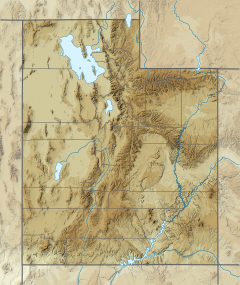Kweeyahgut Peak
| Kweeyahgut Peak | |
|---|---|
 Northeast aspect, from jetliner | |
| Highest point | |
| Elevation | 12,855 ft (3,918 m)[1] |
| Prominence | 995 ft (303 m)[2] |
| Parent peak | Mount Lovenia (13,219 ft)[1][2] |
| Isolation | 4.33 mi (6.97 km)[2] |
| Coordinates | 40°42′01″N 110°38′36″W / 40.7001856°N 110.6433598°W[3] |
| Geography | |
| Country | United States of America |
| State | Utah |
| County | Duchesne |
| Protected area | High Uintas Wilderness |
| Parent range | Uinta Mountains Rocky Mountains |
| Topo map | USGS Explorer Peak |
| Geology | |
| Rock age | Neoproterozoic |
| Rock type | Metasedimentary rock |
| Climbing | |
| Easiest route | class 2[2] |
Kweeyahgut Peak is a 12,855-foot-elevation (3,918-meter) mountain summit in Duchesne County, Utah, United States.
Description
[edit]Kweeyahgut Peak is set within the High Uintas Wilderness on land managed by Ashley National Forest.[1] It is located in the Uinta Mountains which are a subset of the Rocky Mountains, and it ranks as the 21st-highest summit in Utah.[2] Topographic relief is significant as the summit rises over 1,700 feet (520 meters) above Ottoson Basin in less than one-half mile. Neighbors include Explorer Peak 1.24 mile to the north, Mount Lovenia 4.32 miles to the north-northeast, and Dead Horse Peak is 3.94 miles to the northwest.[1] Precipitation runoff from this mountain drains into tributaries of the Duchesne River.

Etymology
[edit]The landform's toponym was officially adopted on September 8, 2022, by the U.S. Board on Geographic Names to replace the previous derogatory "Squaw Peak" name.[3] In the Ute language, "kwiyagat" (kweeyahgut) means "bear," which is a sacred animal to the Ute.[4]
Climate
[edit]Based on the Köppen climate classification, Kweeyahgut Peak is located in a subarctic climate zone with cold snowy winters and mild summers.[5]
See also
[edit]References
[edit]- ^ a b c d "Kweeyahgut Peak, Utah". Peakbagger.com. Retrieved 2023-06-15.
- ^ a b c d e "Kweeyahgut Peak - 12,855' UT". listsofjohn.com. Retrieved 2023-06-15.
- ^ a b "Kweeyahgut Peak". Geographic Names Information System. United States Geological Survey, United States Department of the Interior. Retrieved 2023-06-15.
- ^ "Our View: Native schools, Durangoherald.com". Retrieved June 15, 2023.
- ^ Peel, M. C.; Finlayson, B. L. & McMahon, T. A. (2007). "Updated world map of the Köppen−Geiger climate classification". Hydrol. Earth Syst. Sci. 11 (5): 1633–1644. Bibcode:2007HESS...11.1633P. doi:10.5194/hess-11-1633-2007. ISSN 1027-5606. S2CID 9654551.
External links
[edit]- Kweeyahgut Peak: weather forecast


